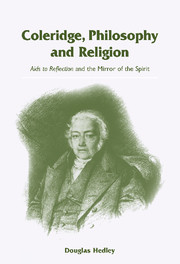Book contents
- Frontmatter
- Contents
- Acknowledgements
- List of abbreviations
- Notes on the text
- Prologue: explaining Coleridge's explanation
- 1 The true philosopher is the lover of God
- 2 Inner word: reflection as meditation
- 3 The image of God: reflection as imitating the divine spirit
- 4 God is truth: the faculty of reflection or human Understanding in relation to the divine Reason
- 5 The great instauration: reflection as the renewal of the soul
- 6 The vision of God: reflection culture, and the seed of a deiform nature
- Epilogue: the candle of the Lord and Coleridge's legacy
- Bibliography
- Index
3 - The image of God: reflection as imitating the divine spirit
Published online by Cambridge University Press: 15 December 2009
- Frontmatter
- Contents
- Acknowledgements
- List of abbreviations
- Notes on the text
- Prologue: explaining Coleridge's explanation
- 1 The true philosopher is the lover of God
- 2 Inner word: reflection as meditation
- 3 The image of God: reflection as imitating the divine spirit
- 4 God is truth: the faculty of reflection or human Understanding in relation to the divine Reason
- 5 The great instauration: reflection as the renewal of the soul
- 6 The vision of God: reflection culture, and the seed of a deiform nature
- Epilogue: the candle of the Lord and Coleridge's legacy
- Bibliography
- Index
Summary
Let us make man in our image, after our likeness.
(Genesis 1: 26)Truth endows men's purposes with somewhat of immutability.
(A. J. and Julius Hare)In The Friend Coleridge discusses William Paley's utilitarianism in some detail. The weakness of this theory, Coleridge avers, is that it confuses morality with law and ‘draws away attention from the will and from inward motives and impulses which constitute the essence of morality, to the outward act’ (F i. 314). In Aids to Reflection Coleridge begins by considering the meaning of the word happiness. For Coleridge morality and religion belong inextricably together: religion is morality with reference to that which is permanent, i.e. God and the soul, and morality is religion in respect of the circumstances in which mankind happens to be placed (cf. Aids, p. 26). Morality is the attempt to organise that which happens, that is, the contingent, with principles which are timeless. Godlikeness or at-one-ment with the divine is the goal of the highest human ethical aspiration. The genuinely religious component in morality lies in the conviction that this aspiration towards reflection of the divine draws upon supernatural aids. Leighton sees the religious life in Augustinian terms of pondus or weight or gravity. This metaphor is used by Augustine to express the teleological striving of creation, and in particular the human soul, towards God and denotes the dependence of the mirroring object upon its source, and the vanity of the finite: ‘I assert that there is such a thing as human happiness, as summum bonum, or ultimate good’ (Aids, p. 45).
- Type
- Chapter
- Information
- Coleridge, Philosophy and ReligionAids to Reflection and the Mirror of the Spirit, pp. 153 - 192Publisher: Cambridge University PressPrint publication year: 2000



